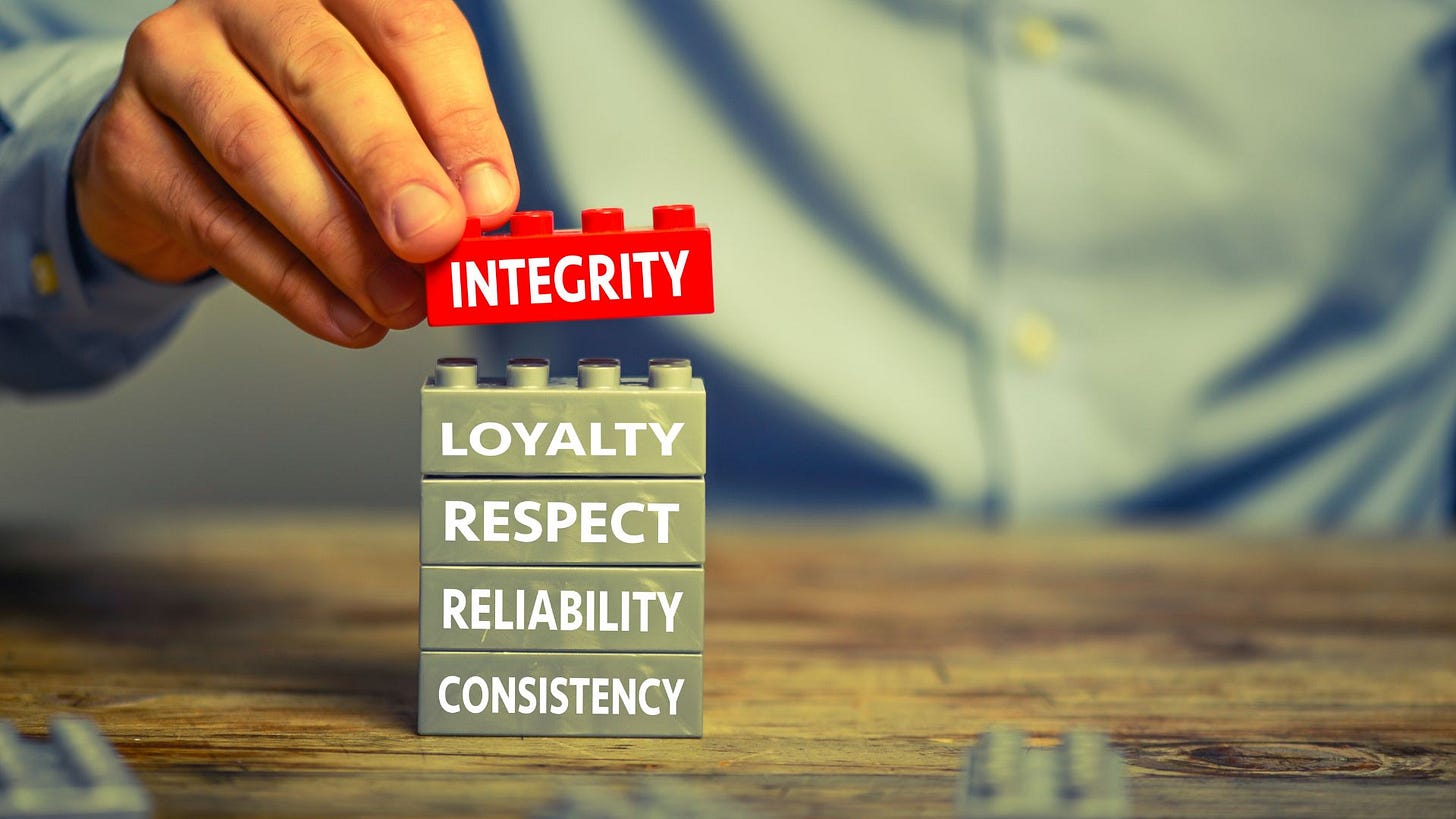Embarking on a Journey of Leadership Mastery: Your Ultimate Guide: Part Nine
In this article, you're going to explore the ins and outs of effective leadership development and uncover strategies that will propel you toward leadership excellence.
Ethical Leadership in Action
In the realm of leadership, ethics serve as the compass that guides principled decisions and shapes the character of a leader. In this section, we'll delve into the principles that underpin ethical leadership and explore strategies to foster a culture of integrity and principled behavior within teams and organizations. By embodying these principles, you'll emerge as a leader who not only achieves success but also leaves a lasting legacy of ethical excellence.
Exploring Ethical Dilemmas and Making Principled Choices
Within the tapestry of leadership, ethical dilemmas often emerge as complex challenges that demand careful consideration. In this section, we'll uncover strategies that empower you to navigate these dilemmas and make choices rooted in principles. By embracing these techniques, you'll not only reinforce your commitment to ethical leadership but also inspire others to uphold the same standards of integrity.
Clarify Your Values: A Foundation for Decision-Making: Begin by clarifying your core values and principles. When faced with an ethical dilemma, align your choices with these foundational beliefs. Reflect on what matters most to you and how your decisions impact those around you. This introspective approach provides a solid compass for navigating ethical challenges.
Weigh the Consequences: Anticipate Ripple Effects: Examine the potential consequences of each choice you're considering. Consider the short-term and long-term impacts on various stakeholders – individuals, teams, the organization, and even the broader community. Prioritize actions that yield positive outcomes and minimize harm to all involved parties.
Seek Counsel: Collaborative Decision-Making: Engage in open discussions with colleagues, mentors, or advisors. Gather perspectives from diverse viewpoints to gain a comprehensive understanding of the situation. Constructive input can shed light on aspects you may have overlooked, leading to more well-informed decisions.
Consult Your Ethics Code: Guided by Principles: Refer to your organization's ethics code or industry standards. These guidelines provide a framework for ethical behavior specific to your context. When facing a dilemma, assess how your choices align with these established principles, using them as a touchstone for making informed decisions.
Consider the Ethical Theories: A Philosophical Approach: Explore ethical theories such as utilitarianism, deontology, and virtue ethics. These philosophical frameworks offer different perspectives on what constitutes ethical behavior. By analyzing the situation through these lenses, you can gain deeper insights into the moral dimensions of your choices.
Test for Transparency: An Integrity Litmus Test: Ask yourself if you would be comfortable with your decision being transparent to all stakeholders. If the answer is yes, your choice likely aligns with ethical principles. Transparency acts as a litmus test, ensuring that your decisions can withstand scrutiny and are grounded in integrity.
Prioritize Long-Term Impact: Building Sustainable Trust: Consider how your decision affects trust and credibility over the long term. Opt for choices that enhance your reputation as an ethical leader, even if they require immediate sacrifice. Prioritizing the long-term impact reinforces your commitment to principled leadership.
By integrating the strategies unveiled, you're poised to navigate ethical crossroads with confidence and conviction. As your ethical choices continue to weave into the fabric of your leadership legacy, you inspire others to uphold the same standards of ethical excellence, enriching the very essence of leadership.
High-Level Strategies to Foster Ethical Leadership Skills
Within the realm of leadership, ethical excellence shines as a foundational pillar, infusing integrity into every action and choice. In this section, we'll explore strategies that elevate your ethical leadership to greater significance, motivating others to adopt an unyielding dedication to ethical conduct. Through the integration of these methods, you'll not only nurture your personal ethical aptitude but also propagate a wave of ethical excellence throughout your organization.
Lead by Example: Integrity in Action: Exemplify the ethical behavior you expect from others. When you demonstrate integrity, transparency, and honesty in your actions, you set a powerful standard for your team and colleagues. Your consistent ethical behavior serves as a touchstone for others to emulate.
Encourage Open Dialogue: Fostering Ethical Conversations: Create a safe space for open dialogue around ethical considerations. Encourage team members to discuss ethical dilemmas, share their perspectives, and seek collective solutions. This fosters a culture where ethical issues are addressed openly, enhancing everyone's ethical awareness.
Institute Ethical Training: Nurturing Ethical Literacy: Implement regular training sessions focused on ethical leadership. These sessions can cover ethical frameworks, case studies, and real-life scenarios. Ethical training enhances the ethical literacy of your team, equipping them with the tools to navigate challenges with principled decision-making.
Establish an Ethics Code: Written Principles to Guide Behavior: Craft a comprehensive ethics code that outlines your organization's core values and principles. This code serves as a beacon, guiding ethical behavior across all levels. It sets clear expectations, reinforces ethical norms, and holds everyone accountable to the same ethical standards.
Foster Ethical Decision-Making Models: Structured Approaches: Introduce structured ethical decision-making models such as the "principles-first" approach or the "ethical triangle." These models provide step-by-step frameworks for evaluating ethical dilemmas. By adopting a systematic approach, your team gains confidence in making ethically sound choices.
Recognize and Reward Ethical Behavior: Reinforcing Values: Acknowledge and celebrate instances of ethical behavior within your organization. Recognize individuals who consistently uphold ethical principles, reinforcing the importance of ethical excellence. These rewards foster a culture where ethical behavior is cherished and acknowledged.
Mentorship and Coaching: Guiding Ethical Growth: Engage in mentorship and coaching to guide individuals in their ethical leadership journey. Share your experiences, offer insights, and provide guidance on navigating complex ethical situations. This mentorship fosters ethical growth and strengthens the ethical fabric of your organization.
As ethical leadership stands unwavering at the core of your journey, these strategies offer a roadmap to elevate it further. By leading with unwavering integrity, encouraging open conversations, and fostering a culture of ethical literacy, you set a precedent that resonates through your organization.
With the implementation of an ethics code, structured decision-making models, and recognition for ethical behavior, you embed ethical excellence into the very DNA of your team. Through mentorship and coaching, you nurture a legacy of principled conduct, ensuring that your influence extends beyond the present moment.
Cultivating a Culture of Integrity and Principled Behavior
Fostering a culture of integrity is akin to nurturing a garden of ethical excellence. In this section, we'll delve into strategies that empower you to embed ethical values deep within your organization's fabric. By embracing these techniques, you'll create an environment where principled behavior flourishes and integrity becomes a cornerstone of every action and decision.
Communicate Core Values Consistently: A Clear Ethical Compass: Articulate your organization's core values in a clear and consistent manner. Ensure that these values resonate throughout all levels and departments. By echoing these principles consistently, you establish a foundation that guides behavior and decision-making with ethical clarity.
Encourage Ethical Role Models: Leadership by Example: Promote ethical role models within your organization, from top leadership to emerging talents. These individuals exemplify ethical conduct and serve as beacons of principled behavior. Their actions demonstrate that ethical leadership is not just a concept, but a tangible reality to aspire to.
Implement Ethical Accountability: Aligning Actions with Values: Incorporate mechanisms that hold individuals accountable for their ethical conduct. Regularly evaluate performance against ethical benchmarks and provide feedback. When actions align with values, individuals feel a stronger connection to the organization's ethos, fostering a culture of integrity.
Foster Open Dialogue: Encouraging Ethical Conversations: Create platforms for open discussions about ethics. Regularly engage teams in conversations about ethical dilemmas and challenges. By fostering an environment where ethical conversations are encouraged, you create a safe space for individuals to seek guidance and explore moral considerations.
Lead with Transparency: Honesty in Action: Model transparent leadership by openly sharing information and addressing concerns. Transparency builds trust, demonstrating that decisions are made based on ethical considerations. When leadership is characterized by transparency, employees are more likely to embrace ethical behavior.
By embedding these strategies into the very fabric of your organization, you sow the seeds of integrity and principled behavior. As they take root and flourish, they create a culture where ethical excellence is not just a goal but a way of life – one that defines your organization's impact and legacy.
Our journey propels us forward to Part Ten: Leadership Legacy, where we'll explore how purposeful leadership initiatives can leave a lasting impact. By navigating ethical dilemmas, fostering ethical leadership skills, and nurturing a culture of integrity, you're crafting a leadership approach that stands as a beacon of ethical excellence. Onward we move, toward embodying principles that inspire and uphold the highest standards of integrity and leadership!





